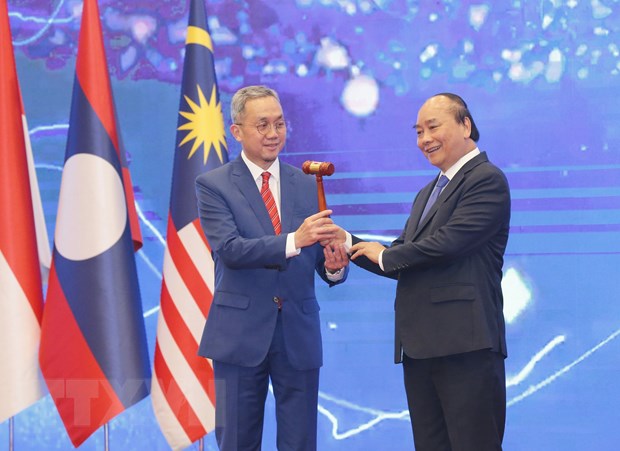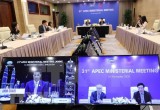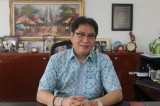ASEAN 2020: Philippine diplomat highly values Vietnam’s leadership role
Vietnam’s leadership to maneuver ASEAN through the COVID-19 pandemic is highly commendable, according to Ambassador Noel Servigon, head of the Permanent Mission of the Phillipines to ASEAN.

Prime Minister Nguyen Xuan Phuc (R) hands over a wooden hammer to the Ambassador of Brunei to Vietnam, as his country will hold the role as ASEAN Chair in 2021.
The country led negotiations on many critical issues spanning cooperation on the three pillars of political-security, economic and socio-cultural cooperation with its external partners, he said in a recent interview granted to the Vietnam News Agency correspondent in Jakarta.
“The mantle of leadership was made heavier as the region moved through the unchartered terrain of the pandemic that brought all of us to unimagined realities,” he said, adding that despite the challenges, Vietnam not only successfully convened ASEAN meetings, but kept the momentum of cooperation going with all of ASEAN's Dialogue and External Partners, as well as through ASEAN-led mechanisms such as the East Asia Summit.
And across these many interactions, Vietnam consistently underscored the primacy of ASEAN centrality, making it clear that ASEAN is in the driver's seat and decides the course of the region's future, according to the ambassador.
The Philippine diplomat said the recently concluded and highly successful 37th ASEAN Summit and Related Summits continued to highlight the importance of ASEAN centrality, and the relevance of ASEAN and its mechanisms.
“At the heart of the Summit was the region's collective response not only to address the enormous challenges posed by the pandemic, but also to embrace the opportunities towards a better future for all our peoples,” he stressed.
Regarding ASEAN’s outsanding achievemtns this year, Noel Servigon said ASEAN adopted a number of forward-looking documents and initiatives which make it clear that the only path forward must be one towards an even deeper regional engagement on vital issues.
The launch of the ASEAN Center for Public Health Emergencies and Emerging Diseases is a prime example, he said, noting “The Center is a manifestation of our collective recognition that if we are to emerge victorious from this current pandemic and avoid future ones, we must work in concert with one another.”
He continued the signing of the Regional Comprehensive Economic Partnership (RCEP) Agreement is another example of the 15 countries joining hands and embracing cooperation in the midst of protectionist pressures.
Apart from the many laudable initiatives conceived in 2020, this year should also be marked by the sheer triumph of the ASEAN spirit - one that is characterized by unity in diversity. “Despite the challenges posed by the pandemic, our resolve to face those hurdles together have never been stronger,” he stated.
The signing of the agreement brought to a close an 8-year process of negotiations and marks the beginning of an even deeper regional integration, he said, adding that this milestone agreement is a beacon of hope in the face of rising protectionism and charts a path to strengthen supply chain connectivity.
The signing of RCEP demonstrates the commitment of 15 countries to freer trade and provides the momentum to economic recovery at a time when the global economy plunges into its worst recession brought about by the COVID-19 pandemic.
“Given the enormous challenges of the pandemic, RCEP is crucial as we connect with countries where supply chains are essential to our economic recovery. Deepening regional integration and strengthening supply chain connectivity is more important than ever,” he said.
It will have far-reaching tangible and collective benefits and advantages for the region and our individual economies by, among others, empowering micro-, small and medium enterprises to gainfully participate in the global value chain, generate jobs and improve standards of living in the region and restore much needed business confidence, according to the ambassador./.
VNA
 Malaysia's digital economy projected to reach 31 billion USD in 2024
Malaysia's digital economy projected to reach 31 billion USD in 2024
 Opportunity to enhance the position of the Global South
Opportunity to enhance the position of the Global South
 Thailand to build new bridge to Cambodia
Thailand to build new bridge to Cambodia
 Bulgaria charts new course with Vietnam on President’s upcoming visit: Diplomat
Bulgaria charts new course with Vietnam on President’s upcoming visit: Diplomat
 Seminar seeks ways to boost ASEAN - Latin America connectivity
Seminar seeks ways to boost ASEAN - Latin America connectivity
 Indonesia seeks India's help in health education
Indonesia seeks India's help in health education
 Indonesia named world's most generous country in 2024
Indonesia named world's most generous country in 2024
 Philippines: Over-4m-high floodwaters make thousands of houses submerged
Philippines: Over-4m-high floodwaters make thousands of houses submerged
 Singapore’s public sector records carbon reduction in 2023
Singapore’s public sector records carbon reduction in 2023
 Pressure facing the EU on its growth track
Pressure facing the EU on its growth track



